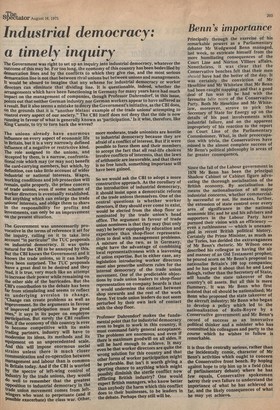Industrial democracy:
a timely inquiry The Government was right to set up an inquiry into industrial democracy, whatever the outcome of this may be. For too long, the economy of this country has been bedevilled by demarcation lines and by the conflicts to which they give rise, and the most serious demarcation line is not that between rival unions but between unions and managements. It would be absurd to imagine that any scheme for industrial democracy or worker directors can eliminate that dividing line. It is questionable, indeed, whether the arrangements which have been functioning in Germany for many years have had much impact on the management of companies, though Professor Dahrendorf, in this issue, Points out that neither German industry nor German workers appear to have suffered as a result. But it also seems a mistake to decry the Government's initiative, as the CBI does, on the grounds that it is "another blatant example of the trade unions' attempting to Control every aspect of our society." The CBI itself does not deny that the tide is now running in favour of what is generally known as 'participation.' Is it wise, therefore, like King Canute, to try to turn back the waves?
The unions already have enormous Influence on every aspect of economic life In Britain, but it is a very narrowly defined influence of a negative or restrictive kind. The role assigned to the unions, and accepted by them, is a narrow, confrontational role which may (or may not) benefit the card-carrying members, but which, by definition, can take little account of wider industrial or national interests. Wages, Working conditions and job protection will remain, quite properly, the prime concern of trade unions, even if some scheme of worker directors is eventually established. But anything which can enlarge the trade unions' interests, and oblige them to share in the responsibility for profits and investments, can only be an improvement on the present situation.
The Government was unnecessarily provocative in the terms of reference it set for the inquiry, calling on it to take into account "in particular" the TUC proposals O n industrial democracy. It was quite natural for the CBI to be annoyed by this. But the CBI knows the Government and it knows the trade unions, so it can hardly have been surprised. The TUC proposals leave a great deal to be desired and they read, it is true, very much like an attempt to increase their power while remaining on the other side of the barricades. But the CBI's contribution to the debate has been far from stimulating and seems to reflect an underlying aversion to change. !Change can create problems as well as ltnprovement. So the arguments in favour Of improved participation must be good ones," it says in its paper on employee Participation. But surely the CBI realises that, if the economy of this country is ever to become competitive with its main trading partners, industry will have to triodernise its ideas, its methods and its equipment on an unprecedented scale. And this will impose enormous social strains unless there is much closer communication and co-operation between !nanagement and labour than is common In Britain today. And if the CBI is worried by the spectre of left-wing control of industry by the trade unions, they would do well to remember that the greatest oPposition to industrial democracy in the trade union movement comes from leftwingers who want to perpetuate (and if Possible exacerbate) the class war. Other, more moderate, trade unionists are hostile to industrial democracy because they are afraid of a conflict of interest. But if it were possible to force them and their members to accept the fact that all real-life choices involve conflicts of interests, that the laws of arithmetic are inexorable, and that there is no free lunch, something important will have been gained.
So we would ask the CBI to adopt a more constructive approach. As the corollary of the introduction of industrial democracy, it should insist upon a democratic reform of the trade unions themselves. One of the central questions is whether worker directors, if they should ever come to exist, would be elected from the shop floor or nominated by the trade union's head office. The argument in favour of trade union nominees is that they may (but only may) be better equipped by education and experience than shop-floor representatives to deal with management problems. A mixture of the two, as in Germany, might have the advantage of combining local representativeness with a leavening of union expertise. But in either case, any legislation introducing worker directors must also prescribe uniform rules for the internal democracy of the trade union movement. One of the predictable objections by trade union leaders to shop-floor representation on company boards is that it would undermine the contact between shop stewards and the rest of the work force. Yet trade union leaders do not seem perturbed by their own lack of contact with the shop floor.
Professor Dahrendorf makes the fundamental point that for industrial democracy even to begin to work in this country, it must command fairly general acceptance. The problems are enormous, and even if there is maximum goodwill on all sides, it will be hard enough to achieve. It may even be that worker directors are quite the wrong solution for this country and that other forms of worker participation might be preferable. But isn't it worth giving a sporting chance to anything which might possibly diminish the sterile conflict now afflicting British industry? One would expect British managers, who know better than anybody the harm which this conflict does to their businesses, to be leaders in the debate. Perhaps they still will be.


































 Previous page
Previous page